SF State physicist explores science denial with ‘Don’t Look Up’ star, director

Image courtsey of Netflix
Physics and Astronomy Chair Joseph Barranco joined director Adam McKay and actor Leonardo DiCaprio to discuss the film and climate change
The new Netflix film “Don’t Look Up” has been garnering attention from the general public, media and scientists alike for its satirical take on climate change (and some people’s denial of it). In an online panel last week, San Francisco State University Chair of Physics and Astronomy Joseph Andrew Barranco joined “Don’t Look Up” director Adam McKay, star Leonardo DiCaprio and SFFILM Director of Programming Jessie Fairbanks to discuss the movie and its message.
The event was held to honor “Don’t Look Up” as the 2021 winner of the Sloan Science in Cinema Prize, which celebrates compelling film depictions of science. In the movie, two astronomers (DiCaprio and Jennifer Lawrence) try to warn the public about a comet on a collision course with Earth. The scientists’ warnings are comically — and tragically — ignored, offering a metaphor for climate change denial.
During the hour-long event, the panelists discussed everything from the inspiration behind the film and its wild success to the dire state of our planet and need for real climate change action. Barranco, a computational astrophysicist and professor at San Francisco State, joined the conversation to add a scientist’s perspective.
“With public debates over our collective response to crises such as COVID or climate change, I wanted to participate in this panel to highlight the crucial difference between the constructive process of peer review, in which scientists submit their analyses to rigorous scrutiny from peer experts with the goal of improving the quality of the results, versus ‘just asking questions’ of pundits and talking heads whose goal is to intentionally sow distrust and spread misinformation,” said Barranco. “Skepticism can be good and productive when it is entered into with good faith arguments, or it can be destructive when it is used solely to create chaos and hinder consensus toward necessary action.”